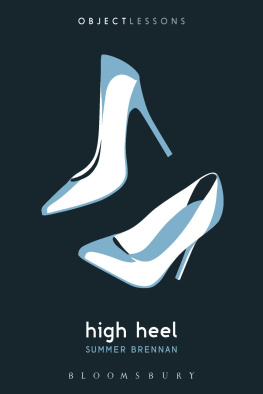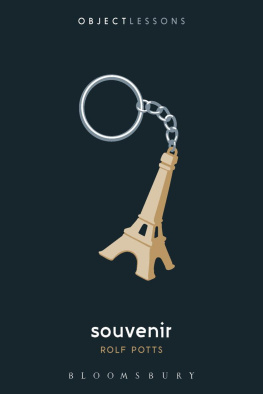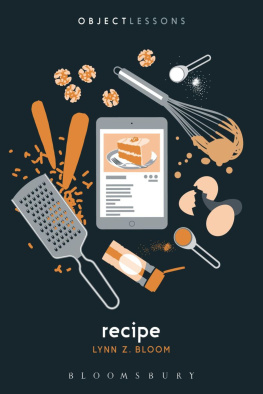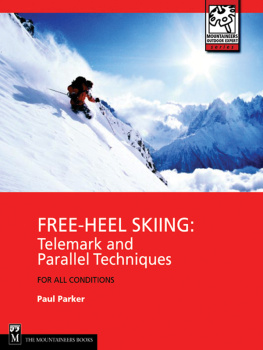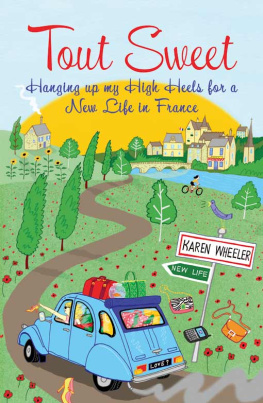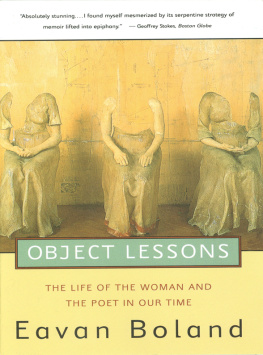The Object Lessons series achieves something very close to magic: the books take ordinaryeven banalobjects and animate them with a rich history of invention, political struggle, science, and popular mythology. Filled with fascinating details and conveyed in sharp, accessible prose, the books make the everyday world come to life. Be warned: once youve read a few of these, youll start walking around your house, picking up random objects, and musing aloud: I wonder what the story is behind this thing?
Steven Johnson, author of Where Good Ideas
Come From and How We Got to Now
Object Lessons describes themselves as short, beautiful books, and to that, Ill say, amen.... If you read enough Object Lessons books, youll fill your head with plenty of trivia to amaze and annoy your friends and loved onescaution recommended on pontificating on the objects surrounding you. More importantly, though... they inspire us to take a second look at parts of the everyday that weve taken for granted. These are not so much lessons about the objects themselves, but opportunities for self-reflection and storytelling. They remind us that we are surrounded by a wondrous world, as long as we care to look.
John Warner, The Chicago Tribune
Besides being beautiful little hand-sized objects themselves, showcasing exceptional writing, the wonder of these books is that they exist at all... Uniformly excellent, engaging, thought-provoking, and informative.
Jennifer Bort Yacovissi,
Washington Independent Review of Books
... edifying and entertaining... perfect for slipping in a pocket and pulling out when life is on hold.
Sarah Murdoch, Toronto Star
... a truly terrific series of meditative reads.
Megan Volpert, PopMatters
Though short, at roughly 25,000 words apiece, these books are anything but slight.
Marina Benjamin, New Statesman
The joy of the series, of reading Remote Control , Golf Ball , Drivers License , Drone , Silence , Glass , Refrigerator , Hotel , and Waste... in quick succession, lies in encountering the various turns through which each of their authors has been put by his or her object... The object predominates, sits squarely center stage, directs the action. The object decides the genre, the chronology, and the limits of the study. Accordingly, the author has to take her cue from the thing she chose or that chose her. The result is a wonderfully uneven series of books, each one a thing unto itself.
Julian Yates, Los Angeles Review of Books
The Object Lessons series has a beautifully simple premise. Each book or essay centers on a specific object. This can be mundane or unexpected, humorous or politically timely. Whatever the subject, these descriptions reveal the rich worlds hidden under the surface of things.
Christine Ro, Book Riot
... a sensibility somewhere between Roland Barthes and Wes Anderson.
Simon Reynolds, author of Retromania: Pop Cultures
Addiction to Its Own Past
O B J E C T L E S S O N S
A book series about the hidden lives of ordinary things.
Series Editors:
Ian Bogost and Christopher Schaberg
Advisory Board:
Sara Ahmed, Jane Bennett, Jeffrey Jerome Cohen, Johanna Drucker, Raiford Guins, Graham Harman, rene hoogland, Pam Houston, Eileen Joy, Douglas Kahn, Daniel Miller, Esther Milne, Timothy Morton, Kathleen Stewart, Nigel Thrift, Rob Walker, Michele White.
In association with

Books in the series
Remote Control by Caetlin Benson-Allott
Golf Ball by Harry Brown
Drivers License by Meredith Castile
Drone by Adam Rothstein
Silence by John Biguenet
Glass by John Garrison
Phone Booth by Ariana Kelly
Refrigerator by Jonathan Rees
Waste by Brian Thill
Hotel by Joanna Walsh
Hood by Alison Kinney
Dust by Michael Marder
Shipping Container by Craig Martin
Cigarette Lighter by Jack Pendarvis
Bookshelf by Lydia Pyne
Password by Martin Paul Eve
Questionnaire by Evan Kindley
Hair by Scott Lowe
Bread by Scott Cutler Shershow
Tree by Matthew Battles
Earth by Jeffrey Jerome Cohen and Linda T. Elkins-Tanton
Traffic by Paul Josephson
Egg by Nicole Walker
Sock by Kim Adrian
Eye Chart by William Germano
Whale Song by Margret Grebowicz
Tumor by Anna Leahy
Jet Lag by Christopher J. Lee
Shopping Mall by Matthew Newton
Personal Stereo by Rebecca Tuhus-Dubrow
Veil by Rafia Zakaria
Burger by Carol J. Adams
Luggage by Susan Harlan
Souvenir by Rolf Potts
Rust by Jean-Michel Rabat
Doctor by Andrew Bomback
Fake by Kati Stevens
Blanket by Kara Thompson
High Heel by Summer Brennan
Pill by Robert Bennett
Potato by Rebecca Earle
Hashtag by Elizabeth Losh (forthcoming)
Train by A. N. Devers (forthcoming)
Fog by Stephen Sparks (forthcoming)
Wheelchair by Christopher R Smit (forthcoming)
For Emily Rose Martinez
I mean, what is a woman? I assure you, I do not know.
I do not believe that you know.
VIRGINIA WOOLF, PROFESSIONS FOR WOMEN
Changes of shape, new forms, are the theme
which my spirit impels me now to write.
OVID, METAMORPHOSES
high heel
Summer Brennan

Contents
My thanks go first to the patient souls who made this book possible, in particular three men who never questioned the idea that feminism, Ovid, biology, and Borges could go together with high heels: editors Haaris Naqvi, Ian Bogost, and especially Christopher Schaberg, for his careful attention to the manuscript and that one out-of-the-blue, book-changing suggestion. Id also like to thank everyone at Bloomsbury, as well as the Jean V. Naggar Literary Agency and my own agents there, Elizabeth Evans and Alice Tasman, for all their hard work behind the scenes.
The greatest of love and thanks to my dear friend Jasmine Dee Balgobin, whose unwavering affection and enthusiasm has meant everything to me throughout the writing of this book, and for the past twenty years; and to my family, Mom, Dad, Lea, Zack, June, Sienna, Aunt Melody, Dan, and Stefan. All my love and thanks also to my husband Michael L. Trujillo for his devotion and support.
Many people helped with the writing of this book through their friendship, scholarship, encouragement, or in other waysin Paris, New York, and New Mexicoas well as through their own writing. I thank you all. Special thanks however go to Allison Devers for fortitude, and Rebecca Solnit for textual and political inspiration.
My brilliant friend Emily Rose Martinez died at age 25, but I once dreamed that I visited her in the city of death, where she lived in a beautiful apartment open to the sky, and had become a Che Guevara-style revolutionary hero. This one is for her.
Then it seemed like falling into a labyrinth:
we thought we were at the finish
but our way bent round and
we found ourselves as it were
back at the beginning...
Socrates, Platos Euthydemus
A woman runs through a forest, chased by a god.
Another attends a ball.
A third stands over a subway grate in white chiffon.
A fourth chains herself to the gates of a palace.
A fifth is carried away.
A sixth is going home now, click click click.
(Another, not counted here, disappears in the darkness.)

